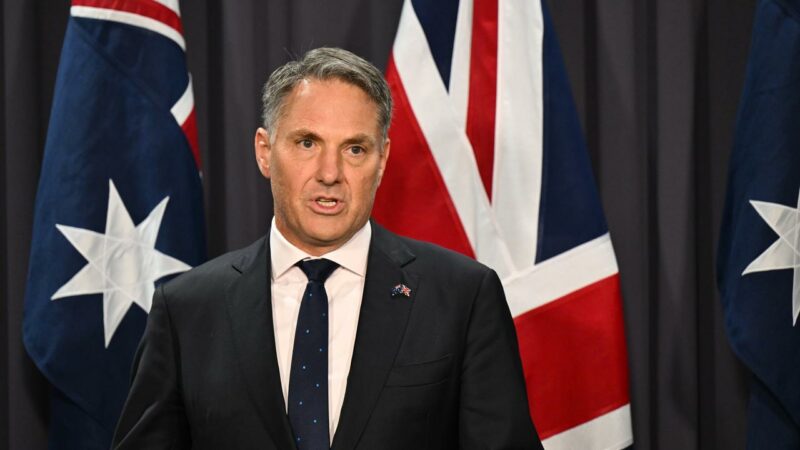A report critical of Australian generals’ leadership in Afghanistan was given to the Defence Minister Richard Marles in November 2023, but was not published until after the McBride sentencing. Stuart McCarthy on a travesty of justice.
After six months of obfuscation until the day whistleblower David McBride was jailed last week for trying to expose wrongdoing by senior defence force officers in relation to Afghanistan war crimes, Defence Minister Richard Marles released a report that largely vindicated McBride’s actions.
The final report of the Afghanistan Inquiry Implementation Oversight Panel was sent to Marles in November last year. Efforts for the report to be published included three Senate orders for the production of documents, numerous freedom of information requests, and a Royal Commission hearing.
Marles’ repeated attempts to conceal the report until the announcement of McBride’s five-year prison sentence obliterate Prime Minister Albanese’s remaining platitudes about improved government transparency, accountability and whistleblower protections.
Afghan war crimes whistleblower David McBride sentenced to prison
The oversight panel was established in response to the 2020 report of the Brereton Inquiry, which found evidence of 39 murders of civilians or detainees by Australian special forces soldiers in Afghanistan.
Chaired by former Inspector-General of Intelligence and Security Dr Vivienne Thom, the panel was given the explicit remit by then Prime Minister Morrison to be “the government’s – and the public’s – independent body to ensure that Defence is making the changes recommended by the [Brereton] inquiry to help ensure we can address any underlying issues. Its role will be an essential part of ensuring ongoing confidence in our defence force.”
Refusing to investigate
Months before the panel’s final report was sent to Marles late last year, government refusals to properly investigate senior defence force commanders had already provided the trigger for those officers to be referred to the International Criminal Court prosecutor.
Under Article 28 of the ICC Statute – on which Australia was a founding signatory – commanders are criminally liable where they “knew or should have known” crimes were being committed but failed to take reasonable steps to prevent the commission of those crimes.
Article 28 of the Rome Statute makes clear this “lack of curiosity” is itself a war crime. https://t.co/3uG2gYbbqb pic.twitter.com/8dZopx8Ud5
— Stuart McCarthy (@StuartMcCarthy_) May 15, 2024
Having hidden behind the flawed Brereton report for years, Marles’ credibility is further tainted by his stalling tactics with the oversight report. Thom and her colleagues demolished the key Brereton findings on command responsibility, namely that no disciplinary action should be taken against any defence personnel above the rank of Sergeant.
International lawyer and defence analyst Dr Glenn Kolomeitz told MWM that Brereton’s “blanket exemption” from investigation given to the higher commanders “is based on a flawed application of the law of command responsibility and a fundamental lack of understanding of the trigger for the ICC to assume jurisdiction.”
Kolomeitz’s 2023 PhD paper studied the application of Article 28 under Australian criminal law, using the Brereton Inquiry as a case study.
Avoiding responsibility
The oversight report says the panel “did not agree with the Brereton Inquiry’s view that some accountability and responsibility could not fall on the most senior officers.”
Echoing the command responsibility doctrine codified in the ICC Statute, the panel found “multiple signs” of war crimes were ignored, concluding “personal knowledge or direct involvement of the senior officers in the causes or behaviour that led to the corporate failure are not required.” The oversight report also says:
“More senior officers have to take some level of responsibility for what goes wrong in their organisation or at least for any circumstances or policies that permitted or facilitated it. If no one at an appropriate level of authority knew anything about the misconduct, that is an organisational failure in itself.”
What the report doesn’t mention is that senior Defence and government officials were, in fact, directly informed of at least some of the alleged murders almost immediately after they occurred, for example, at Sola then Darwan in Afghanistan’s Uruzgan province in September 2012.
McBride’s affidavit to the ACT Supreme Court said that in 2013, he became concerned about the subsequent scapegoating of innocent soldiers aimed at masking command accountability for unlawful killings and decisions by those commanders about what information was or was not being disclosed to the public.
His public interest defence was disallowed by Justice David Mossop and he was forced into pleading guilty after crucial evidence was literally removed from his defence lawyers on national security grounds.
Not only do the Afghanistan oversight panel’s findings and conclusions vindicate McBride’s concerns and echo the command responsibility doctrine codified in the ICC Statute, Marles’ and his department’s handling of the report further highlights the abuse of security classifications as a means of preventing scrutiny of wrongdoing by senior government officials.
Crime to report a crime: outrage as government turns screws on whistleblower David McBride
Marles obfuscation pre-empted
In the cover letter for their report to Marles on 8 November 2023, the panel actually pre-empted the Defence Minister’s obfuscation, writing that it
has been advised by Defence that there is no need or justification for this report to be classified.
Yet when Marles finally allowed the report to be published last week, he claimed in his covering letter to the Senate, “I previously advised that prior to the release of the documents sought by these orders, further advice needed to be sought from the Office of the Special Investigator.”
 Loading...
Loading...
This claim appears to be just as spurious as Marles’ claims of public interest immunity, previously demolished in the Senate. However Marles did succeed in delaying the report’s tabling until the moment McBride was sentenced in the ACT Supreme Court across Lake Burley Griffin.
The report was the subject of a freedom of information request to Defence on 29 October last year. Defence requested a 14-day extension to the statutory FOI deadline on the grounds of “competing priorities currently impacting the relevant line area.”
The department eventually provided one of the panel’s previous quarterly reports but refused to produce the final report on the grounds of public interest immunity, namely “the document contains information that the exposure could prejudice the effectiveness of the Australian Defence Force.” This refusal contradicts the oversight panel’s own covering letter to the Minister, basically countermanding a written recommendation from the independent panel commissioned to “oversight” the same department’s response to war crimes allegations.
Interestingly, Defence FOI staff “did not identify any documents in relation to” correspondence with Marles on the oversight panel reports. Regardless of whether “advice” to the Minister is anything more than a figment of Marles’ imagination, what’s clear is,
there was no need for such “advice” in the first place other than as a pretext for stonewalling.
Did Marles lie to the Senate?
Back across the lake in Parliament House, the Senate first ordered the oversight report be tabled on 28 February this year. After Marles claimed the document “may contain prejudicial information,” on 18 March the Senate ordered documents “containing advice the report contained prejudicial information” be tabled.
The Senate rejected Marles’ claims and made a further order on 26 March requiring Marles’ representative in the Senate to comply with the previous two orders by the following afternoon. Senator Malcolm Roberts told the chamber: “The question is: from where did this advice appear? It smells like a delaying tactic. To be frank, I don’t believe the claim of prejudice is genuine.”
Investigation failure
For its part, the ability of the Office of the Special Investigator (OSI)’s ability to investigate senior defence force commanders is even less credible than its performance in investigating dozens of alleged murders. After almost four years and hundreds of millions of dollars, OSI has yielded only one criminal charge. Kolomeitz, who drafted last year’s referral of senior Australian commanders to the ICC Prosecutor, says of the OSI:
“If, as it appears, the OSI is institutionally incapable of conducting any serious investigation into the command responsibility of the higher commanders, Australia is clearly inactive.”
The ICC has made it abundantly clear that inactivity in these circumstances is the trigger for the assumption of jurisdiction.
The OSI has itself previously obfuscated the Senate on its role in addressing command responsibility for the alleged war crimes. When OSI Director-General Chris Moraitis testified to Senate Estimates last year about the legality of rules of engagement and targeting orders given to special forces troops in Afghanistan, he deflected key questions back to Defence, the organisation he’s supposed to be investigating.
Evading the Royal Commission
Marles’ handling of the oversight panel report has also been raised in recent Royal Commission hearings. On 7 March, Counsel Assisting the Royal Commission into Defence and Veteran Suicide asked the Defence Minister about when the report would be released. Marles waffled replied:
“I’m not about — I don’t have a timeframe in my head, so if you’re asking me to give evidence on this, that’s the answer to your question, and, you know, I’m not going to be drawn on making assumptions on that now. I mean, the answer to your question is I don’t have a timeframe in my head. What we will do is respond to that thoroughly.”
The oversight panel itself testified to the Royal Commission 11 days later, on 18 March, the same day Roberts called out Marles’ “delaying tactics” in the Senate.
Counsel assisting the Commission explained that although the panel provided their final report to Marles last November because the report wasn’t yet released by the Defence Minister, they could only provide “principles-based” answers on the matters raised in their report. However, on the question of command responsibility, oversight panel member and former Secretary of the Attorney-General’s Department Robert Cornell said:
“… if you’re looking organisationally and if you’re looking at leadership and if you’re looking at culture … you should look at it from a much higher level, at the level at which the most senior people should, in our view, take responsibility for it and at least analyse where there were failings in leadership, and if in fact there were such failings, and that hasn’t happened.”
Royal Commission chair Nick Kaldas had by this time already identified “catastrophic leadership failures” in Defence and government as “a real risk to Australia’s security” and one of the key factors behind struggling defence force recruitment and retention.
Et tu, Mark Dreyfus
If Attorney-General Mark Dreyfus’ refusal to drop the McBride prosecution wasn’t bad enough, his cabinet colleague Marles’ concealment of the Afghanistan oversight report is a new low for the Albanese government.
Not only does Marles’ repeated defiance of Senate orders based on non-existent “advice” constitute contempt of Parliament, his obfuscation to the Royal Commission shows a similarly contemptuous attitude towards the ultimate avenue of government transparency available under the Australian democratic model.
All this with the aim of perverting the outcome of a criminal trial that jailed the only person yet to be held accountable for Afghanistan war crimes – the whistleblower.
McBride’s lawyer, Mark Davis, announced an appeal against Mossop’s rulings “on the meaning of duty” moments after his client was marched out of court to jail. According to Davis, “This is an issue of national importance, indeed international importance, that a Western nation has such a narrow definition of duty.”
We can only speculate at this stage what role the Defence Minister’s handling of the Afghanistan war crimes oversight report might play in that appeal.
Has Four Corners done the Government’s dirty work in the David McBride prosecution?
Stuart McCarthy is a medically retired Australian Army officer whose 28-year military career included deployments to Afghanistan, Iraq, Africa, Indonesia and Papua New Guinea. Stuart is an advocate for veterans with brain injury, disabilities, drug trial subjects and abuse survivors. Twitter: @StuartMcCarthy_

